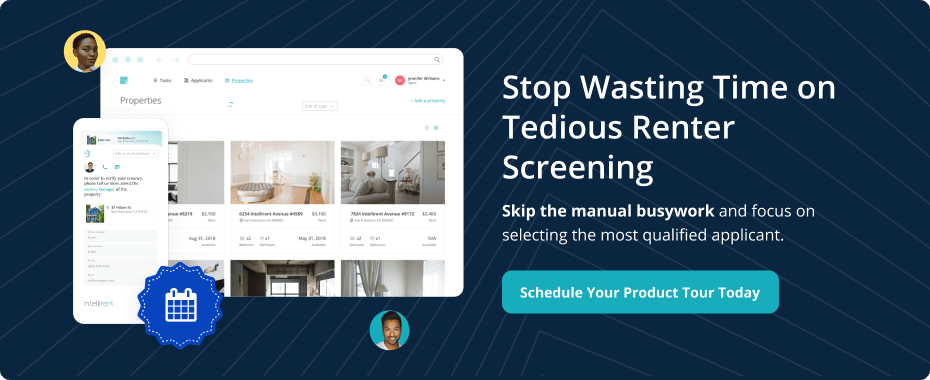July 11, 2023 • 6 min read

You wouldn’t go grocery shopping, with a specific meal in mind, without a list. But, if you did, you could expect to come home with many items you shouldn’t have bought, probably missing some crucial ingredients for the week’s meals.
Similarly, you shouldn’t screen tenant rental applications without setting clear, consistent rental criteria for your applicants. If you do, you’ll fall into the trap of traditional leasing and spend way more time than is necessary… and you likely won’t get the best results.
But how do you know what criteria to set for your property? Whether you’re a new property owner or a seasoned manager, carefully consider the rental criteria you list for your property. The criteria you offer will dictate the kind of applicants — and ultimately the kind of renters — you get into your properties.
Still trying to figure out where to start?
This post covers seven common rental criteria many property managers use to find the very best tenants for their available properties. After reading, you should have all the information you need to build up your rental criteria.
Why You Need Common Rental Criteria
What are rental criteria? Rental criteria help property managers find the most qualified and reliable tenants. These criteria establish standards that can help you evaluate potential renters. By setting clear and objective rental criteria, property managers can avoid potential legal issues and discrimination claims arising from inconsistent or biased selection processes.
Related Read: How Long Does Tenant Screening Take? & 5 Tips to Help Agents Go Faster
You can enjoy various benefits when implementing rental criteria in your application process. First and foremost, common rental criteria can save you valuable time. By establishing standardized criteria to apply to all applicants, you can streamline your application process and make informed decisions about potential renters more quickly and easily.
Rental criteria also contribute to a more organized and efficient renter selection process. Using consistent criteria, property managers can easily compare and evaluate applicants based on credit history, income stability, and rental references.
This systematic approach enables property managers to make reliable assessments and select renters most likely to fulfill their rental obligations. Additionally, it helps create a fair and transparent process, as all applicants are evaluated on the same set of criteria, ensuring equal treatment for all.
Implementing rental criteria can save you time, trouble, and headaches in numerous areas. These criteria help mitigate legal risks and potential discrimination claims, save time and streamline the renter selection process. By establishing clear and objective standards, property managers can evaluate applicants more efficiently and make well-informed decisions, setting both you and your renter up for success!
Common Rental Criteria to Consider
1. Credit Score
A credit score is one of the most important criteria when selecting the right residents for your properties. An applicant’s credit score is a strong indicator of their financial history and responsibility, giving you a sense of how likely they are to pay rent on time.
You should set a minimum credit score and communicate this number to applicants clearly and transparently. Your baseline will vary depending on location, property type, and personal preferences.
Establishing a minimum credit score requirement ensures that all applicants have a strong history of financial responsibility. This information helps set expectations for your renters and enables you to select the applicants most likely to be able to pay their rent consistently, on time, and in full.
Consider:
Remember that young people or individuals with limited credit history might have low credit scores. These applicants have a lower score not due to financial irresponsibility but simply a lack of experience renting property. Property managers can look beyond the credit score and consider other factors like income stability or personal references.
2. Gross Income
The next criterion is gross income. Many property managers require their renters to have a monthly income level. Putting this requirement in place helps you ensure your renters can comfortably afford their rent and other living expenses.
What gross income threshold should you list in your criteria? This figure will vary depending on your location and property type. A good rule of thumb is to set the gross income to about 2.5 or 3 times the monthly rent for your property. You can verify gross income through documentation like pay stubs, job offer letters, tax forms, and more.
Consider:
Don’t forget that not all qualified applicants will have paystubs or W2s. Consider applicants with non-traditional income sources, such as self-employed individuals or freelancers. You can validate income using statements like tax returns or bank statements for these applicants.
3. Employment History
Stable employment is a strong indicator of consistent income, an essential criterion for good-fit renters for your properties. When your applicants have consistent employment, you can rest easy knowing they can make their rent payments on time and in full.
Property managers typically look for employment at a single company or in a single field for an extended period, preferably with a strong, steady income source attached.
Consider:
Although consistent employment is essential, you should still be flexible and willing to make exceptions for unique circumstances. Renters who have recently accepted a new job or relocated to the area might fall under this category. These renters can still be strong tenants, even if they cannot point to a long stable history with their current employer.
4. Rental History*
Some property managers gain insight into a tenant's reliability by contacting previous property owners. Chatting with the owners of the renter’s previous homes allows you to verify the applicant’s rental history, including whether they paid rent on time and took good care of the property.
*Please note that in some states, contacting previous property managers may be restricted or require the tenant's consent.
Consider:
Take the time to familiarize yourself with local regulations before you reach out! Check with your state and local laws and processes to ensure you follow the appropriate procedures regarding this information.
5. Background Check
Criminal background checks are essential to maintaining a safe, secure rental environment for your property, yourself, and all the other residents on your property or in your area. Run a background check on every applicant looking to rent from you. Then, read through the results carefully, giving special attention to the following:
- Felonies
- Violent offenses
- History of evictions
Conducting a thorough background check is the only way to make an informed decision about the well-being of your property and your other renters.
Consider:
It's worth considering a tool that can help speed up the background check process, making it more efficient and reliable. Intellirent lets you attract, screen, and approve reliable renters in less than 24 hours, efficiently flagging potential issues on background checks and helping you find the most fitting renters for your properties.
6. References
Asking for personal or professional references is another valuable tool for property managers to assess a tenant's character and reliability. References can provide insights into the tenant's behavior, responsibility, and ability to maintain positive relationships.
Who should you ask your applicants to provide as references? Previous property managers, employers, or close personal friends who can vouch for the applicant’s trustworthiness are all excellent options! Contacting these references can help property managers better understand the applicant’s rental history, work ethic, and overall suitability for their property.
Consider:
The qualitative nature of reference information can make scoring challenging, but the effort is worth the outcome in this case!
7. Lease Terms
Finally, you will want to ensure you establish clear and comprehensive lease terms. Make these terms available to potential renters, showing applicants the rights and responsibilities of both you and your renters.
The transparency of providing clear lease terms right off the bat can lead to a smooth and painless rental experience for both you and your renters. Property managers typically include a variety of information in these terms. Some fields you might consider including in your terms are:
- Length of lease
- Rental payment terms
- Consequences for breaking the lease
A well-drafted lease agreement protects you, your property, and your renters, so putting this into place is well worth the time and effort.
Consider:
Your renters will need to know all the fees they must pay to make an informed decision about renting your property. Consider including a security deposit, pet fees, smoking fees, and more in your lease agreement.
Beyond Rental Criteria: Streamline Your Leasing Process
Including these seven common rental criteria in your application and approval processes can help you select the best renters for your properties, saving you the headaches and hassle of delinquency, property damage, and more.
Implementing a solution like Intellirent can remove the hassle of screening your rental applicants. Instead, you can perform robust background and credit checks, check employment history and income, and improve high-quality renters in hours instead of days.
Schedule a product tour today to see if Intellirent is the right solution for you and your properties!
Published by Kara Hohne
July 11, 2023
Related Articles
August 08, 2023 • 5 min read
August 01, 2023 • 6 min read
Subscribe For Insights
Get actionable leasing tips, tools, and best practices directly to your inbox. Don't miss out on the insights that'll help your team confidently find, screen, and approve the most qualified renters.


